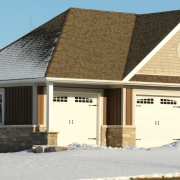How Winter Moisture Can Damage Your Garage Floors
Winter isn’t usually the time of year you associate with sweating, but as temperatures drop in the Carolinas, the moisture in your garage increases. This combination of cold temperatures and excessive moisture means your concrete garage floors can start to condensate, potentially damaging the garage floor, garage structure or the objects inside it.
What Causes Excess Moisture in the Winter?
Garage condensation can be very common in the wintertime when temperatures reach dramatic lows. The colder the air temperature, the less moisture the air can hold, doubling the relative humidity as the temperature decreases by 20 degrees Fahrenheit. Concrete also tends to be colder than the air, and contact with the moist, warmer air causes sweat, just like it would on a cold glass in the summertime. Additionally, every time you drive your snowy or wet car into the garage, you’re introducing even more moisture, as well as tracking in road salts and deicers.
How Does Moisture Damage Your Garage and its Concrete Floors?
As more moisture is introduced into your garage and settles on your floor, it can seep into porous uncoated concrete. Cold temperatures will cause that moisture to freeze and expand within the concrete, which can cause stress fractures and cracks. The continuous cycle of water freezing and melting can cause spalling or scaling, which is when the concrete surface flakes, peels, breaks or chips away.
Another risk to your concrete garage floor is subflorescence, which is the re-crystallization of salt in the concrete pores when the moisture finally evaporates. This also causes spalling, in addition to causing hard-to-remove white stains on the floor’s surface.
As moisture builds up in the garage, it can also cause damage to the garage itself. Moisture in the walls and ceiling can lead to mold and mildew. It can also cause metal items in your garage to rust. Finally, the excess moisture on the surface of the concrete can make the floor slippery and potentially dangerous.
How to Combat Winter Moisture Issues
-
Reduce Air Humidity
Installing a dehumidifier can make a drastic impact on the amount of moisture in your garage. For a 400-500 S.F. garage, use a unit rated for 2,500 S.F. or larger. Using a dehumidifier rated for a larger space will be the fastest and most efficient way to reduce moisture, and it will be powerful enough to keep up with drafts. You must also make sure that the dehumidifier is rated for working in colder temperatures, as that will impact its effectiveness as well.
-
Improve Air Circulation
Adding a fan in your garage can help circulate the air, and if it keeps the air near the concrete surface moving, it cannot rest long enough to cool and condense.
-
Keep the Garage Door Tightly Sealed
Garages tend to not be as tightly sealed as the interior of your home, mostly due to the size of the garage door. Adding a garage floor door seal can greatly reduce the amount of cold air or moisture that can enter the garage. Also, be sure to weatherproof any regular doors or windows in the garage with weatherstripping.
-
Insulate the Space
Use vapor barriers on the garage walls to prevent water from penetrating drywall and insulation. You can also install plastic vapor barrier sheets directly over the existing insulation.
-
Heat the Garage
This is not always practical, but it is an option to prevent your concrete floor from getting cool enough to condense the air that comes in contact with it. When selecting a space heater or garage floor heater, select one that is electric and not propane, because the propane combustion creates water vapor.
-
Apply a Concrete Coating
One of the best ways to protect the concrete floors in your garage and prevent excess moisture is to install a concrete coating like epoxy. This can reduce condensation on the garage floor, while also improving the safety, longevity and appearance of your garage. The experts at Carolina Custom Garages can help you select the best concrete coating for your garage.

